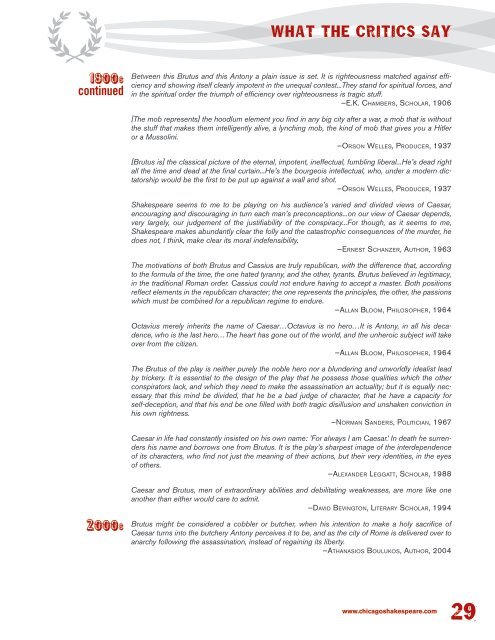Julius Caesar • 2013 - Chicago Shakespeare Theater
Julius Caesar • 2013 - Chicago Shakespeare Theater
Julius Caesar • 2013 - Chicago Shakespeare Theater
Create successful ePaper yourself
Turn your PDF publications into a flip-book with our unique Google optimized e-Paper software.
1900s<br />
continued<br />
2000s<br />
WHAT THE CRITICS SAY<br />
Between this Brutus and this Antony a plain issue is set. It is righteousness matched against efficiency<br />
and showing itself clearly impotent in the unequal contest...They stand for spiritual forces, and<br />
in the spiritual order the triumph of efficiency over righteousness is tragic stuff.<br />
—e.k. ChamBers, sCholar, 1906<br />
[The mob represents] the hoodlum element you find in any big city after a war, a mob that is without<br />
the stuff that makes them intelligently alive, a lynching mob, the kind of mob that gives you a Hitler<br />
or a Mussolini.<br />
—orson Welles, proDuCer, 1937<br />
[Brutus is] the classical picture of the eternal, impotent, ineffectual, fumbling liberal...He’s dead right<br />
all the time and dead at the final curtain...He’s the bourgeois intellectual, who, under a modern dictatorship<br />
would be the first to be put up against a wall and shot.<br />
—orson Welles, proDuCer, 1937<br />
<strong>Shakespeare</strong> seems to me to be playing on his audience’s varied and divided views of <strong>Caesar</strong>,<br />
encouraging and discouraging in turn each man’s preconceptions...on our view of <strong>Caesar</strong> depends,<br />
very largely, our judgement of the justifiability of the conspiracy...For though, as it seems to me,<br />
<strong>Shakespeare</strong> makes abundantly clear the folly and the catastrophic consequences of the murder, he<br />
does not, I think, make clear its moral indefensibility.<br />
—ernesT sChanzer, auThor, 1963<br />
The motivations of both Brutus and Cassius are truly republican, with the difference that, according<br />
to the formula of the time, the one hated tyranny, and the other, tyrants. Brutus believed in legitimacy,<br />
in the traditional Roman order. Cassius could not endure having to accept a master. Both positions<br />
reflect elements in the republican character; the one represents the principles, the other, the passions<br />
which must be combined for a republican regime to endure.<br />
—allan Bloom, philosopher, 1964<br />
Octavius merely inherits the name of <strong>Caesar</strong>…Octavius is no hero…It is Antony, in all his decadence,<br />
who is the last hero…The heart has gone out of the world, and the unheroic subject will take<br />
over from the citizen.<br />
—allan Bloom, philosopher, 1964<br />
The Brutus of the play is neither purely the noble hero nor a blundering and unworldly idealist lead<br />
by trickery. It is essential to the design of the play that he possess those qualities which the other<br />
conspirators lack, and which they need to make the assassination an actuality; but it is equally necessary<br />
that this mind be divided, that he be a bad judge of character, that he have a capacity for<br />
self-deception, and that his end be one filled with both tragic disillusion and unshaken conviction in<br />
his own rightness.<br />
—norman sanDers, poliTiCian, 1967<br />
<strong>Caesar</strong> in life had constantly insisted on his own name: ’For always I am <strong>Caesar</strong>.’ In death he surrenders<br />
his name and borrows one from Brutus. It is the play’s sharpest image of the interdependence<br />
of its characters, who find not just the meaning of their actions, but their very identities, in the eyes<br />
of others.<br />
—alexanDer leGGaTT, sCholar, 1988<br />
<strong>Caesar</strong> and Brutus, men of extraordinary abilities and debilitating weaknesses, are more like one<br />
another than either would care to admit.<br />
—DaviD BevinGTon, liTerary sCholar, 1994<br />
Brutus might be considered a cobbler or butcher, when his intention to make a holy sacrifice of<br />
<strong>Caesar</strong> turns into the butchery Antony perceives it to be, and as the city of Rome is delivered over to<br />
anarchy following the assassination, instead of regaining its liberty.<br />
—aThanasios Boulukos, auThor, 2004<br />
www chicagoshakespeare com 29




